 Petzlover
Petzlover Russo-European Laika is originated from Russia but Toy Australian Shepherd is originated from United States. Russo-European Laika may grow 24 cm / 10 inches higher than Toy Australian Shepherd. Russo-European Laika may weigh 14 kg / 31 pounds more than Toy Australian Shepherd. Both Russo-European Laika and Toy Australian Shepherd has almost same life span. Both Russo-European Laika and Toy Australian Shepherd has same litter size. Russo-European Laika requires Low Maintenance. But Toy Australian Shepherd requires Moderate Maintenance
Russo-European Laika is originated from Russia but Toy Australian Shepherd is originated from United States. Russo-European Laika may grow 24 cm / 10 inches higher than Toy Australian Shepherd. Russo-European Laika may weigh 14 kg / 31 pounds more than Toy Australian Shepherd. Both Russo-European Laika and Toy Australian Shepherd has almost same life span. Both Russo-European Laika and Toy Australian Shepherd has same litter size. Russo-European Laika requires Low Maintenance. But Toy Australian Shepherd requires Moderate Maintenance
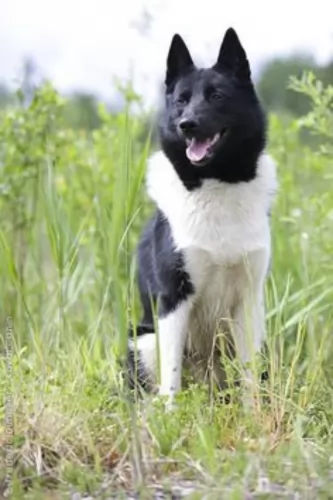 The Russo-European Laika is a hunting dog that comes from Russia.
The Russo-European Laika is a hunting dog that comes from Russia.
It is a dog that has been developed from Spitz type dogs. A breeding program was started for the dog in 1944.
The Russo-European Laika dog is recognized by the Federation Cynologique Internationale in the Spitz and Primitive type group.
 These beautiful little dogs interestingly don’t originate in Australia. They were originally bred in the western U.S. as herding dogs.
These beautiful little dogs interestingly don’t originate in Australia. They were originally bred in the western U.S. as herding dogs.
Today they are mainly companion dogs. Their lineage goes back to a pair of sibling dogs - the Wildhagen Dutchman and Fieldmaster of Flintridge and these two dogs began the lineage to which the Miniature Australian Shepherd belongs.
Known also as ‘Aussie’, there are different stories to its exact origins. It is thought that some Basque farmers brought dogs with them when they came to Australia, taking them to the United States during the 1849 California gold rush.
The dog has been crossed with a number of breeds to bring about a dog that could cope with harsh temperatures.
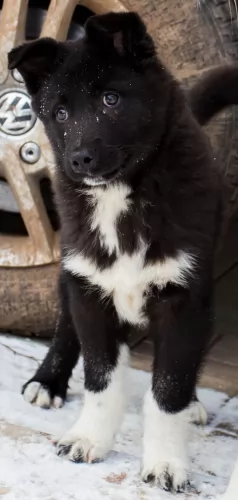 The Russo-European Laika is a medium sized dog Spitz dog that stands at between 54 to 60cm in height and weighs in the region of 20 – 23kg.
The Russo-European Laika is a medium sized dog Spitz dog that stands at between 54 to 60cm in height and weighs in the region of 20 – 23kg.
The dog has quite a strong resemblance to the Karelia Bear Dog. They are sometimes mistaken for each other.
The Russo-European Laika has the typical triangular shaped head with small dark eyes, a black nose and erect, pointed ears. These are deep chested dogs.
As with other Spitz breeds, this dog has a thick fur with a densely furred tail which is curved over the back. The double coat is fairly long and usually a dark grey color or black with some white markings. Sometimes the dog has a white coat.
This is a lively, energetic dog breed that loves to spend time outdoors. It has always been used to alert hunters to prey, using its bark to alert the hunter.Training and socialization will be necessary for the dog if you don’t want it to be barking in the house too.
He makes an excellent guard dog, protecting his human family. It is very tolerant of children too, getting on well with them as well as other pets.
The dog is known for being totally devoted to its family, being an affectionate and loyal breed that doubles as a family pet and guard dog.
 The Toy Australian Shepherd, also referred to as the Mini- or Miniature Australian Shepherd is a small dog standing at between 26 - 36 cm in height and weighing between 3 to 9kg.
The Toy Australian Shepherd, also referred to as the Mini- or Miniature Australian Shepherd is a small dog standing at between 26 - 36 cm in height and weighing between 3 to 9kg.
He has a medium-length, weather-resistant coat which is white with tan, black, red or blue merle. The coat is long, and slightly wavy with feathering around the legs and neck.
They eyes can be blue or brown or he can have two differently colored eyes.The tail of these dogs can be a natural bobtail or it is docked. They do shed but they don’t require that much grooming.
These playful little dogs may be small, but they are brave and full of courage. They’re also easy going, and love nothing more than to be around their human family.
They love the games that children play and are always ready to join in, making excellent playmates for children. Lively and alert, they also make good watchdogs and because they are so intelligent, they are easy to train and socialize.
Their intelligence means they need to be physically and mentally stimulated otherwise they can become destructive from sheer boredom. They’re full of energy and will require regular exercise every day.
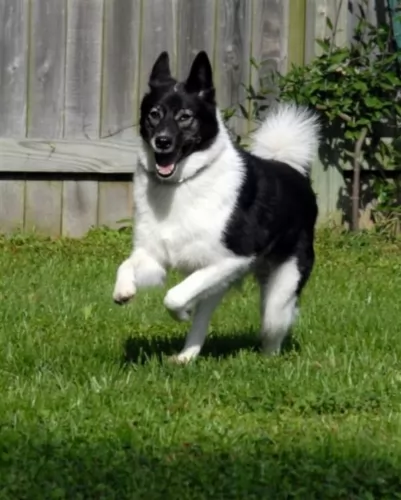 This is an intelligent dog breed, loving the time he spends with his human family but reluctant to be patted by strangers.
This is an intelligent dog breed, loving the time he spends with his human family but reluctant to be patted by strangers.
They also get along with pets that they have grown up with. They get on well with kids and make great watchdogs too. Small wonder they make such sought after pets and companions.
 The Toy Australian Shepherd is such a clever little dog and eager to learn too. You won’t have trouble getting him trained and socialized as he is eager to learn.
The Toy Australian Shepherd is such a clever little dog and eager to learn too. You won’t have trouble getting him trained and socialized as he is eager to learn.
He bonds closely with his human family, becoming a loyal, devoted pet. They are also great playmates for children. They’re the kind of dogs that will require mental and physical stimulation if they are to to be prevented from becoming bored and frustrated.
They need social interaction with their human family and will be devastated if they were to be stuck in the backyard and all but forgotten.
They have a lifespan of 12 – 14 years and you want to make sure they’re happy, contented years, because he is wiling to play his part and make you a wonderful pet and companion.
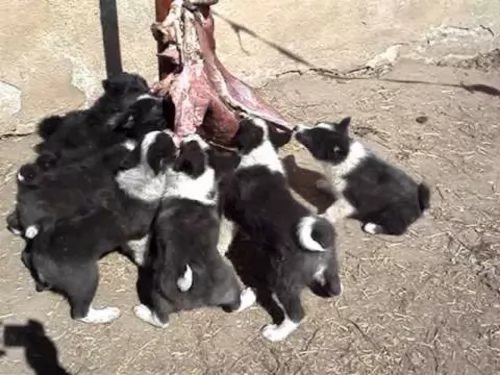 These Spitz type dogs are always known to enjoy good health, and owners don’t have to worry too much about their health as only a small number of health issues are reported with this healthy dog breed.
These Spitz type dogs are always known to enjoy good health, and owners don’t have to worry too much about their health as only a small number of health issues are reported with this healthy dog breed.
This is a congenital defect in the abdominal muscles and can result in fat or tissues being evident under the skin. A bulge is often seen in the area of the abdomen. Larger hernias will require surgery.
 Make sure your Toy Australian Shepherd sees the vet as a puppy to be dewormed and to get his first puppy injections.
Make sure your Toy Australian Shepherd sees the vet as a puppy to be dewormed and to get his first puppy injections.
Dental disease is far more serious than you think. It can affect other areas of your dog’s body. Plaque and inflamed gums lead to bone- and tooth loss.
Bad breath is a sign of periodontal disease. Find out from your vet what to do to guard against periodontitis. It’s important because ignoring bad teeth can lead to heart disease, with bacteria constantly entering the blood stream.
Fleas and ticks are your pet’s enemy as well as heartworm. Dogs can die from heartworm infestations. Heartworm is linked to mosquito bites, so if you live in warm areas, check with your vet for preventative measures.
This is another common dog illness to watch out for. This is a painful condition where the hip joint isn’t formed properly and it can lead to terrible pain and lameness.
Just like people endure endless misery with eczema, dogs too can develop skin allergies. They can create endless frustration and misery for any pet because of the terrible itch and pain. All the licking and scratching can lead to secondary bacterial infections too.
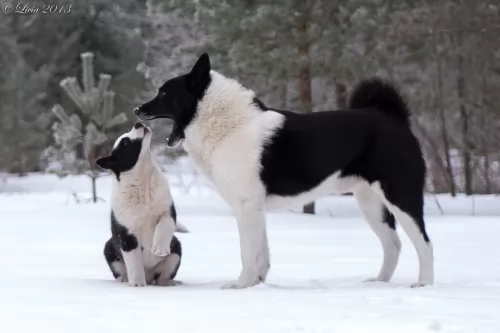 This is an energetic dog and will require a good amount of excerise. This dog isn’t suited to living in the city as they are highly active. Apart from wanting large grounds to run around in, he will need walks as well as ball- and rope games to keep him busy.
This is an energetic dog and will require a good amount of excerise. This dog isn’t suited to living in the city as they are highly active. Apart from wanting large grounds to run around in, he will need walks as well as ball- and rope games to keep him busy.
He is intelligent and needs some form of mental stimulation. There are good quality toys which one can buy for these dogs than can make them think.
Many things can change a dog’s longevity, and diet is one. A good nutritious diet with vitamins and minerals will give your dog less of a chance to get sick.
If you go for the best quality commercially manufactured dog foods, you’ll find that they are both convenient and well balanced.
To provide your dog with just a bit of variety in his diet, some home-made food added into the dry kibble from time to time will delight your pet.
No need to make preparing the food a huge issue either. Boil brown rice and chicken in a pot and add in sweet potatoes, carrots and spinach. Chop all this up and add small portions of it into the dry kibble.
Try to include a bit of raw meat occasionally and never let your dog be without a constant source of fresh, cool water
 Your puppy will need 4 small bowls of food a day. If you’re wondering just how much, either speak to your vet or follow the portion-guide on the packaging of the puppy dog food.
Your puppy will need 4 small bowls of food a day. If you’re wondering just how much, either speak to your vet or follow the portion-guide on the packaging of the puppy dog food.
As your puppy grows older, you feed less frequently so that he is getting two meals a day as an adult. For feeding an adult, there are excellent commercial dog foods available - remember to choose a good brand for your dogs age, size and energy levels.
Try and give him some tasty home-made food too from time to time – nothing exotic and spicy – just plain foods such as boiled chicken, brown rice, spinach, sweet potatoes and carrots. Dogs thrive on simple, healthy food like this. Make sure he always has a bowl of cool, fresh water to drink.
These energetic little bundles of fur will need regular exercise – every day in fact. He’s a smart little dog too, so you need to provide him with stimulating games that will keep his mind and his body physically fit.
Reduce shedding and loose hair by brushing the long hair a least twice a week. This will also help to get rid of matting. Trim nails and check for fleas and ticks.
Provide your Toy Australian with a warm, dry, peaceful place to sleep. If he is outside often, make sure he has both sun and shade to lie in as well as a sheltered spot for when it rains.